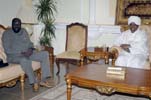
In February 2010, Sudan is scheduled to hold its first democratic elections in 24 years. General elections are required by the Comprehensive Peace Agreement, or CPA, which ended a second civil conflict between northern and southern Sudan that lasted two decades, killed 2 million people, and displaced 4 million more. The original premise and promise of elections—democratic transformation, consolidating the peace, and making unity attractive—have been marred by the ruling National Congress Party’s four-year pattern of obstructionism, which has stalled progress on the implementation of the CPA, and sapped good will between North and South.
Enough’s latest strategy paper, “Sudan’s Election Paradox,” argues that the international community needs to lower its expectations for the election and develop a multilateral strategy to press the Government of National Unity in Khartoum to enact meaningful reforms regardless of who wins in 2010, revitalize CPA implementation, and establish a framework for talks in Darfur that are consistent with the power-sharing provisions of the CPA.
Here’s a clip:
Democratic elections are still vital to the fate of the CPA and the future of Sudan, but it will take more than a poorly managed election to address the root of Sudan’s crisis—the hoarding of wealth and power in Khartoum at the expense of a marginalized periphery. It is important, then, to manage expectations and have realistic goals that reflect the current challenges and constraints. Elections will not magically transform Sudan, but pushing to complete elections peacefully in February 2010 could provide impetus to clear the cluttered backlog of delayed CPA benchmarks and help identify the major challenges to holding a credible referendum in 2011.
Listen to Enough policy assistant Rebecca Brocato discuss the paper here and check out this nifty timeline of upcoming notable dates:

